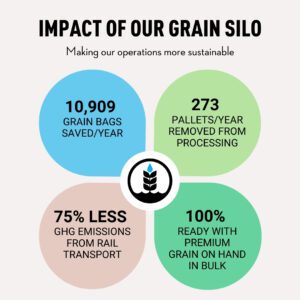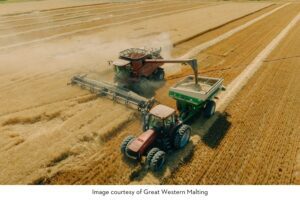More Sustainable Brews Ahead: The Impact of Our Grain Silo
More Sustainable Brews Ahead: The Impact of Our Grain Silo
Posted by Winslow Sawyer
5 months ago | November 21, 2024
Estimated Reading Time: 2 minutes, 57 seconds
Brewing high-quality beer is only part of Pure Project’s mission. We’re equally committed to brewing responsibly, which is why we’re excited to share a major milestone in our sustainability efforts: the installation of a grain silo at our brewery headquarters in Vista. This equipment isn’t just a logistical upgrade—it’s a significant leap forward, making the brewing process more efficient while reducing the environmental impact of our brewery’s operations.
More Grain, Less Environmental Impact
In the beer world, hops may get most of the fame, but the largest ingredient used to make beer (besides water) is grain! Looking ahead, we’re on track to use over 600,000 pounds of grain in our beers over the next year.
With the switch to a grain silo—filled with high-quality pilsner malt from our partners at Great Western Malting—we’ve made significant strides in waste reduction and efficiency:
Saving 10,909 Grain Bags
By eliminating the need for bagged grain, we’re bidding farewell to the nearly 11,000 grain bags we’d otherwise use in a year! While we previously repurposed empty grain bags as trash bags in our taprooms, this step to eliminate them is a significant win for sustainability. Not only does it streamline our operations, but it also cuts down on packaging materials—helping to keep waste out of the environment.

No More Pallets
A further benefit of silo storage is the reduction in pallet shipments. Without the need for bagged grain, we no longer require the 273 pallets that would need to be transported to our brewery this year. This means fewer trucks on the road, reducing the strain on transportation networks and cutting down on fuel use and carbon emissions.
A Logistical Win: Rail vs. Trucks
Another exciting environmental advantage of the grain silo is how we’re transporting the grain. Using standard 50-pound grain bags calls for processing multiple shipments, while grain for the silo is brought to us 40,000 pounds at a time. Instead of relying on trucks to transport bagged grain, which traditionally contribute a significant amount of greenhouse gas emissions, we’re shifting to rail transport. This change will have a positive impact on reducing carbon footprint.
The EPA (U.S. Environmental Protection Agency) reports that freight railroads account for just 0.5% of total U.S. greenhouse gas emissions and 1.8% of emissions from the transportation sector, in contrast to cars, which contribute 58.5%, and trucks, which account for 23.4%. Transporting freight by rail rather than by truck can reduce greenhouse gas emissions by as much as 75% on average1, demonstrating a significant advantage for reducing fuel consumption and environmental impact.
By choosing rail over road, we’re reducing the environmental cost of bringing the grain to the brewery. This shift is critical to our overall strategy to minimize our carbon footprint and invest in greener logistical methods.
 A GREENER PURE WEST
A GREENER PURE WEST
Our core WC IPA, Pure West, captures the spirit of the West Coast with its bold hop-forward profile and crisp, clean malt character. And since Pure West is brewed with 100% silo-stored Great Western Malting grain, we’re able to reduce its environmental footprint while preserving its exceptional quality. As one of the beers we brew the most, we’re excited to say that Pure West is now even more sustainably made, thanks to the silo!
WHY IT MATTERS: SUSTAINABILITY AT THE CORE OF PURE PROJECT
 At Pure, we’re always looking for ways to improve not only the beer we craft but also the processes that bring it to life. By investing in a grain silo, we’re making strides toward a more sustainable future—one that prioritizes environmental responsibility without sacrificing the quality of our beer.
At Pure, we’re always looking for ways to improve not only the beer we craft but also the processes that bring it to life. By investing in a grain silo, we’re making strides toward a more sustainable future—one that prioritizes environmental responsibility without sacrificing the quality of our beer.
This move is part of our ongoing initiatives to reduce waste, increase efficiency, and minimize our carbon footprint across every part of our brewery’s operations. Whether it’s the ingredients we use, the production methods we choose, or the packaging and merch materials we select, we’re always asking ourselves: how can we do better for the planet?
Here’s to brewing responsibly and drinking sustainably. Cheers!






